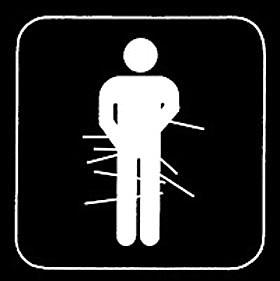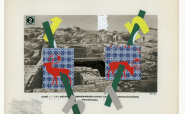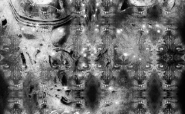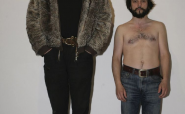| Umělec magazine 2001/3 >> A View on Globalization at the Slovinian pavilion in Venice | List of all editions. | ||||||||||||
|
|||||||||||||
A View on Globalization at the Slovinian pavilion in VeniceUmělec magazine 2001/301.03.2001 Nataša Petrešin | news | en cs |
|||||||||||||
|
The prevailing multicultural
tendencies of late postmodernism and its pluralist aesthetics have ultimately merged into the globalized world of new technology, interaction and speed that McLuhan envisioned years ago. Although our existence today is confronting the climax of the capabilities that the post-human world is offering — the mess of total alienation through new media and painful remainders of old ethnic and ethical problems — understanding globalization as an ideological movement might not be so far off the mark. Since the last decade of the 20th century the art world has likewise turned into a unified field of interests, bringing together East and West, all continents equally embraced within one colossal market. In a way, each individual artist fits into this context and, consequentially, speaking about globalization and art without firm frames of reference is becoming a tricky business today. Aurora Fonda, Slovenian commissioner for this year’s Venice Biennale and freelance curator and art critic, decided to re-connect the discourse with the practice and offer a view on globalization in the context of the Biennale. Two artists were chosen to represent Slovenia (Tadej Pogačar and Vuk Čosić) and the Italian art group, 0100101110101101.ORG, were also invited to participate in the curatorial project entitled Absolute One. The title corresponds to Kelvin’s absolutes and alludes to the opposite, more optimistic, perspective on the situation in the world. Tadej Pogačar, artistic director of the PARASITE Museum of Contemporary Art and new parasite artist, invited sex workers from all over the world to organize their first world congress, symbolically set outside the Giardini entrance. With their presence at the Biennale, Pogačar sponged off this specific social group, using them as his own material and context. The sex worker world congress was so successful that the artist and the sex activists plan to meet once again to take on the problems of a globalized world. Pioneer of net.art, Vuk Čosić, exhibited an ironic and deliberately narrow-minded work representing the most famous icons from the history of art, but abstracted as airport signs. Humor and conceptual sharpness are consistently present in Čosić’s online works, whereas in the pavilion another important dimension is fulfilled: the installation of new media work within a gallery context. He inserted into the pavilion his own curated exhibition presenting major net.art activists including Heath Bunting, RTMark and Alexei Shoulgin. All participants exhibit physical art objects, shrewdly moving away from the online field of art to the material world. Well known for their hacktivist orientation — mirroring and downloading other net.artists’ websites while arguing strongly against any form of copyright on the net — Italian net.artists 0100101110101101.ORG created a special virus as an art piece for the Biennial. The group initially intended to infect the Biennial’s website (www.labiennaledivenezia.org) but failed to hack its security system. Instead, each visitor of the exhibition could buy a T-shirt or CD artifact, thereby becoming a possible co-creator of the otherwise friendly virus. Written instructions for creating and deleting the virus function as exposures of failed attempts to control the uncontrollable — tactics that globalization itself tries to effect.
01.03.2001
Recommended articles
|
|||||||||||||











Comments
There are currently no comments.Add new comment